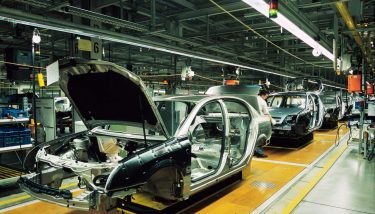“
Reeling from a £3.4bn quarterly loss, Jaguar Land Rover is sniffing around ride-share app Addison Lee. Is this what automotive manufacturers need to do to grab a piece of burgeoning ride-share market?

London’s second biggest taxi provider, Addison Lee, has been put up for sale by its owner, the Carlyle Group, with Jaguar Land Rover (JLR) one of the prospective buyers of the taxi firm app, according to UK media reports.
Leaving aside where it would find the money (the Carlyle Group is looking for at least £300m, and probably a lot more), such a car manufacturer/car sharing collaboration could offer growth opportunities for the automotive industry.
In fact, any move would be the latest attempt by a car manufacturer to strategically position itself to embrace the predicted future of shared transportation and mobility, driverless vehicles, and electric cars.
Share and share we like
“We love cars, but we want them to be used,” Graeme Risby, CEO & co-founder of car-sharing app Hiyacar, told The Manufacturer. “There will be a lot more people sharing cars in the future, not owning them.”
Hiyacar allows car owners to rent out their own vehicles when they’re not in use, decreasing the amount of time they spend parked. Since its founding three years ago, over 70,000 people have joined, with the London-based platform planning rapid expansion into cities across the UK, to fulfil its mission of connecting car owners and drivers.
“The relationships with the automotive manufacturers are already there,” says Risby. “We have spoken to major OEM’s and both sides want to push electric vehicles and partner for the changing demands of the future.”
There’s hope for the car industry yet
A 2017 report from Capgemini indicated that 34% of car consumers felt that ride hailing or car-sharing were viable alternatives to vehicle ownership. But, 56% still considered it complementary to car ownership, not a direct replacement.
Every year, Britain produces nearly two million vehicles, with 80% of these exported to more than 100 countries.

JLR also intends to release a raft of new fully electric and hybrid vehicles in the next few years, include the new I-PACE The company already has a contract to supply Waymo, formerly the Google self-driving car project, with a fleet of 20,000 self-driving I-PACEs in 2020. It’s also pledged that all new models from that year will be fully electric or hybrid.
If JLR buys Addison Lee it offers the carmaker the chance to massively extend its business offerings. The purchase bridges the gap between itself, existing and proven technology and the desire for servitization (essentially developing the capabilities needed to provide services and solutions to supplement existing product offerings).
So long as the shared mobility market continues to gain momentum, it’s likely to be a worthwhile investment of time and money in the long-term.
Eventually, consumers may simply want to be connected to their destination and just won’t be concerned whether they own that car, or if it even has a driver. And let’s not forget that UK legislation on emissions targets means the shift to widespread electrification is imminent.
JLR has been trying to deal with falling sales of diesel cars and a drop-off in Chinese demand. Moreover, despite the UK producing nearly two million vehicles a year, global car sales continue to slow. This is due in part to the rising popularity of car-sharing and pay-per-use transport models, such as Addison Lee and Uber.
